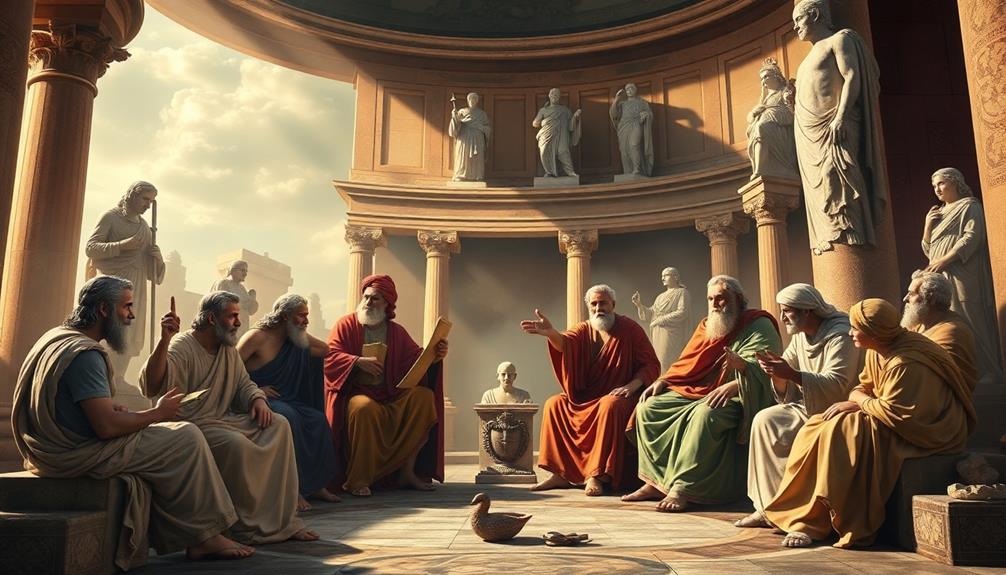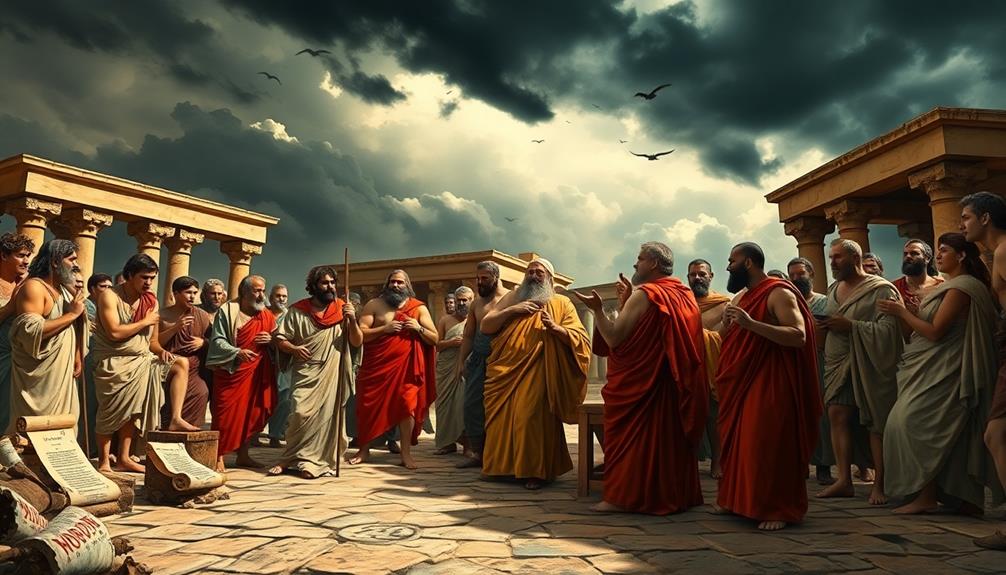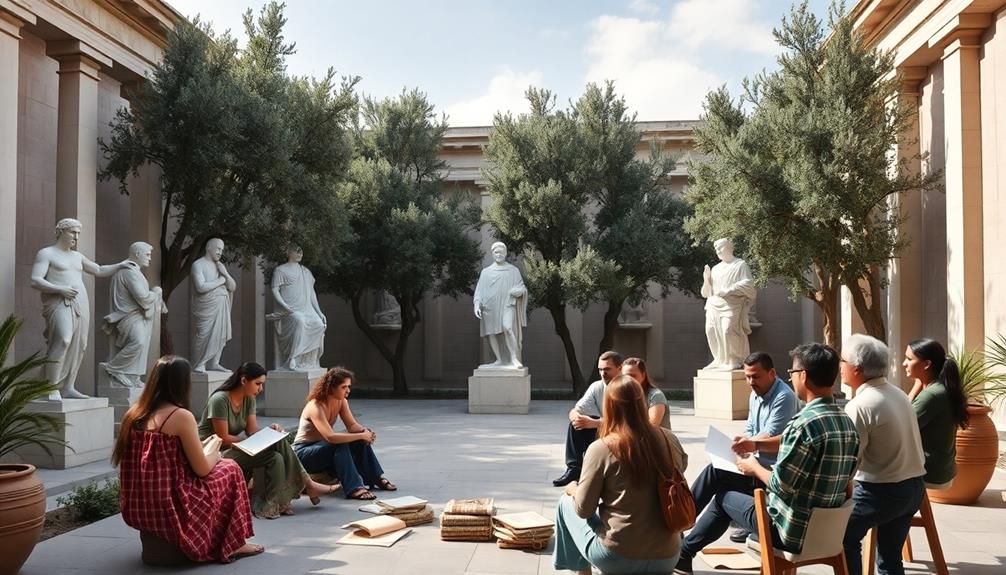Ancient skeptics challenged dogmatism by promoting critical inquiry over blind acceptance. They believed you should suspend judgment until you've thoroughly examined conflicting beliefs. Thinkers like Pyrrho and Sextus Empiricus argued that true knowledge is unattainable, urging you to embrace a lifestyle of inquiry. Their methods emphasize recognizing biases and engaging in open dialogue. By cultivating a culture of skepticism, they pushed back against fixed dogmas, advocating for tranquility through contemplation. This rich history continues to shape modern philosophical thought, encouraging you to question beliefs and seek deeper understanding as you explore these fascinating ideas further.
Key Takeaways
- Ancient skeptics, like Pyrrho, promoted suspension of judgment (epoché) to achieve tranquility and challenge dogmatic beliefs.
- Pyrrhonian skepticism questioned the certainty of knowledge, advocating for continuous inquiry over fixed beliefs.
- Key figures like Carneades emphasized reasonable judgments based on probable beliefs despite inherent uncertainties.
- The conflict of impressions encouraged critical examination of beliefs, fostering a culture of open dialogue and exploration.
- Ancient skepticism's legacy influenced modern philosophy, promoting humility and critical inquiry in the pursuit of truth.
Ancient Skepticism Defined
What does ancient skepticism really mean? At its core, ancient skepticism, rooted in the Greek term "skepsis," emphasizes the importance of investigation and inquiry. It encourages you to embrace a suspension of judgment until you've attained reliable knowledge.
This philosophical approach, particularly evident in Pyrrhonian skepticism, challenges you to question the certainty of your beliefs and the assertions of knowledge that others present. Notably, just as astrology claims to influence personality traits, ancient skeptics argue that our perceptions can be shaped by various factors, necessitating a deeper exploration of our convictions.
You may find that ancient skeptics, like Pyrrho, advocate for living without fixed beliefs, promoting a lifestyle of inquiry rather than dogmatism. They argue that conflicting impressions arise from our experiences, making it essential to pause and reflect rather than jump to conclusions.
This suspension of judgment, or epoch, distinguishes ancient skepticism from mere doubt, as it calls for a deeper examination of what constitutes truth.
Key Figures of Skepticism

Ancient skepticism was shaped by influential thinkers who challenged established beliefs and emphasized the importance of inquiry. Pyrrho, the founder of Pyrrhonian skepticism, argued that to achieve tranquility, one must suspend judgment, as he believed no one can attain certain knowledge. His student, Timon of Phlius, enriched skeptical thought by introducing isosthenia, which claims that arguments for and against any belief are equally balanced.
This emphasis on inquiry and critique resonates with the ideas of utilitarian thinkers' declarations, who also advocated for questioning traditional moral frameworks.
In the domain of Academic skepticism, Arcesilaus positioned himself against the Stoics by asserting that knowledge is impossible and promoting the suspension of judgment as a path to virtue. His ideas were further developed by Carneades, who contended that while certainty is out of reach, reasonable judgments could be made based on probable beliefs.
Sextus Empiricus stands out as the most prominent proponent of Pyrrhonian skepticism, where he meticulously outlined various modes of skepticism in his works. He stressed the necessity of inquiry and the critique of dogmatic beliefs, encouraging you to question assumptions and remain open-minded.
Each of these figures contributed considerably to the evolution of skepticism, shaping our understanding of inquiry and belief.
Mechanisms of Skeptical Inquiry
When you explore the mechanisms of skeptical inquiry, you'll notice the significance of suspending judgment, or epoché, in steering conflicting impressions.
This approach not only encourages critical examination of beliefs but also fosters a deeper understanding by weighing opposing arguments.
Additionally, adopting a mindset akin to enhancing customer interactions can facilitate a more open dialogue and help in recognizing biases that may cloud judgment.
Suspension of Judgment
Emphasizing the need for a balanced perspective, the suspension of judgment (epoché) serves as a foundational mechanism in skeptical inquiry. For you, this practice, championed by Pyrrhonian skeptics, means stepping back from dogmatic assertions and engaging in philosophical discussions that challenge your beliefs.
When you suspend judgment, you allow yourself to explore conflicting arguments and experiences without the weight of absolute certainty. This reflective practice mirrors the principles of Cultural Intelligence (CQ), which encourage understanding diverse perspectives and enhancing adaptability in various contexts.
This approach enables you to critically assess various opinions and appearances, guiding your actions based on plausibility rather than rigid conclusions. As you investigate different viewpoints, you foster a more thorough examination of beliefs, identifying potential biases and falsehoods in your reasoning.
The suspension of judgment helps you navigate the complexities of knowledge, encouraging a deeper understanding of the world.
However, critics argue that this suspension may lead to cognitive paralysis, complicating how you apply skeptical inquiry practically. Balancing your exploration of ideas with a willingness to act becomes essential.
Ultimately, the suspension of judgment empowers you to engage more thoughtfully with the myriad beliefs that shape human understanding.
Conflict of Impressions
Conflicting impressions often bombard you, challenging your beliefs and prompting a deeper inquiry into the nature of knowledge. Ancient skeptics emphasized the importance of the suspension of judgment (epoché) when faced with such contradictions. They argued that it's rational to refrain from affirming beliefs until you thoroughly examine conflicting viewpoints.
The process of skeptical inquiry involves questioning various beliefs and experiences. This approach helps you uncover potential falsehoods while guiding actions based on plausibility rather than certainty. As Sextus Empiricus highlighted, many assertions of knowledge reflect dogmatism, encouraging you to critically investigate opposing arguments.
Here's a simple overview of the mechanisms involved:
| Key Concepts | Description | Example |
|---|---|---|
| Suspension of Judgment | Refraining from accepting beliefs | Doubting absolute truths |
| Conflicting Impressions | Encountering opposing viewpoints | Different interpretations |
| Skeptics | Thinkers advocating for rigorous inquiry | Sextus Empiricus |
In this landscape of conflicting impressions, you're encouraged to foster a culture of inquiry. By critically examining beliefs, you can avoid the pitfalls of dogmatic acceptance.
Examination of Beliefs
How can we truly examine our beliefs without falling into the trap of dogmatism? Ancient skeptics provide valuable insight through their practice of suspension of judgment, or epoché. They encourage you to adopt an open inquiry, resisting the urge to accept beliefs at face value. By examining contradictory arguments and experiences, you can foster a deeper understanding of your views.
In a similar way, personalized learning approaches in education emphasize the importance of adapting to individual needs, which can also inspire a more nuanced examination of beliefs.
Skeptics might suggest that you critically evaluate dogmatic assertions, which often mask uncertainty. Instead of clinging to one perspective, aim for equipollence—recognizing that no single argument holds absolute truth. This balanced consideration allows you to navigate the complex landscape of competing beliefs.
The ultimate goal of this skeptical inquiry is to achieve tranquility, or ataraxia. By suspending judgment, you create space for peace of mind, freeing yourself from the anxiety that often accompanies rigid beliefs.
Embrace the discomfort that comes with questioning, and you'll find clarity and insight. In this journey of exploration, you'll not only challenge your own convictions but also cultivate a mindset that values truth over certainty, leading to a more profound understanding of yourself and the world around you.
The Criterion of Truth

In the quest for truth, ancient skeptics critically examined various criteria proposed by philosophical schools like the Stoics and Epicureans. They focused on the reliability of sense perceptions and cognitive impressions, questioning the Stoics' claim that true perceptions could be distinguished from illusions.
Meanwhile, Epicurus asserted that all sense perceptions are inherently true, which skeptics found troubling. This led you to reflect on the criterion of truth with a skeptical lens.
To navigate conflicting impressions, skeptics employed the suspension of judgment, or epoché, as a rational response. This approach parallels modern advancements in enhanced natural language processing, which improve human-computer interaction by fostering more nuanced conversations.
By withholding definitive conclusions, they emphasized the significance of inquiry and reflection over certainty. This approach allowed you to weigh the merits of opposing arguments, fostering a deeper understanding of the complexities surrounding knowledge.
Sextus Empiricus significantly articulated this balanced examination, introducing the concept of equipollence, where no single argument holds more weight than another.
This critical stance not only shaped the ancient discourse on truth but also impacted the foundations of modern epistemology. Ultimately, the ancient skeptics' exploration of the criterion of truth remains an essential part of the ongoing dialogue about knowledge and certainty.
Historical Context and Influence

Ancient skepticism arose amid the philosophical turbulence of the Hellenistic period, challenging the dogmatic assertions of schools like the Stoics and Epicureans. This era, marked by the conquests of Alexander the Great, created a rich environment for philosophical inquiry, where the discussions of skepticism gained prominence.
Thinkers like Pyrrho and Sextus Empiricus pushed the boundaries of what it meant to know, urging a suspension of judgment and a careful examination of conflicting arguments. Their emphasis on inquiry resonates with the importance of self-awareness, as it encourages individuals to critically reflect on their beliefs and assumptions.
You can see how their ideas reshaped the landscape of ancient Greek philosophy. By questioning the certainty of knowledge, they invited others to reconsider their beliefs and the criteria for truth. This shift encouraged a deeper exploration of the possibility of knowledge, as skeptics highlighted the relativity of claims made by various philosophical traditions.
The legacy of these early skeptics extends beyond their time, influencing subsequent thinkers and laying the groundwork for modern epistemology. Their emphasis on inquiry and doubt fostered a culture of challenging assumptions, reminding us that the pursuit of knowledge often requires a willingness to question even our most deeply held beliefs.
Pyrrhonian vs. Academic Skepticism

Skepticism in the Hellenistic period presents two distinct yet intertwined paths: Pyrrhonian and Academic. Pyrrhonian skepticism, founded by Pyrrho, champions the suspension of judgment (epoché) as a means to achieve tranquility (ataraxia). It thrives on the idea that conflicting beliefs should be continuously examined, leading to a state of uncertainty. In contrast, Academic skepticism, rooted in the Platonic tradition, accepts that some propositions can be deemed more probable than others, often engaging in negative dogmatism.
Here's a quick comparison of the two:
| Aspect | Pyrrhonian Skepticism | Academic Skepticism |
|---|---|---|
| Knowledge Claims | Claims true knowledge is unattainable | Accepts some knowledge as probable |
| Argumentation Style | Utilizes modes to demonstrate equipollence | Asserts logical reasoning can justify beliefs |
| Key Figures | Pyrrho, Nescio | Carneades, Nesciam |
The debate between these two forms of skepticism profoundly influenced later philosophical discussions, shaping how one comprehends certainty and belief. Whether you lean toward the Pyrrhonian path or the Academic one, each offers a unique lens through which to examine knowledge.
Relativism and Metaphysical Challenges

The tension between knowledge and belief raises profound questions about relativism and the metaphysical foundations that support them. Ancient skeptics, like Protagoras, introduced the idea that "man is the measure of all things," highlighting the role of individual perception in defining truth. This cultural relativism sparked Socratic inquiries, challenging you to reflect on the validity of subjective truths and their implications for knowledge.
Additionally, just as the health benefits of rapeseed honey underscore the importance of individual experience in wellness, so too does the subjective nature of beliefs inform our understanding of reality.
Aristotle critiqued this relativism by emphasizing the importance of clear questions and objective standards. He believed that without a firm foundation, beliefs become unstable, which aligns with the metaphysical debates initiated by Plato.
In his dialogues, Plato distinguished between the perceptible domain and the eternal Forms, suggesting that empirical knowledge may be inherently flawed.
This interplay between skepticism and metaphysics pushed you to investigate the nature of reality and the limits of human understanding. As you explore deeper into these themes, you'll see how ancient thinkers laid the groundwork for ongoing discussions about the relationship between belief and knowledge, revealing the complexities of relativism and the metaphysical challenges that arise from it.
Implications for Modern Philosophy

A thorough exploration into ancient skepticism reveals significant implications for modern philosophy, particularly in how we engage with knowledge and truth.
The ancient skeptics, like Sextus Empiricus, emphasized the suspension of judgment (epoché) as a means to achieve tranquility. This approach fundamentally challenged the dogmatic assertions of their time.
Just as individuals grappling with BPD benefits from psychotherapy to navigate their emotional turmoil, modern thinkers can benefit from a critical examination of their beliefs to foster understanding and self-awareness.
Modern philosophy grapples with these themes, and you might find it enlightening to reflect on the following:
- The necessity of critical inquiry, promoting skepticism over blind acceptance.
- The importance of humility and open-mindedness in philosophical discussions.
- The ongoing debate around the criteria for truth and belief systems.
- The influence of skepticism on figures like Descartes and Hume, shaping contemporary thought.
Frequently Asked Questions
What Did Ancient Skeptics Believe?
Ancient skeptics believed in suspending judgment about knowledge claims. They emphasized inquiry over certainty, arguing that conflicting perceptions require careful investigation. Their ultimate goal was achieving tranquility by accepting the limitations of human understanding.
What Is Skeptical Dogmatism?
Imagine a tightrope walker, balancing between certainty and doubt. Skeptical dogmatism claims some beliefs can be more probable than others, urging you to question and evaluate knowledge while accepting that absolute certainty might forever elude you.
What Did the Sceptics Believe?
Skeptics believed in questioning certainty. They encouraged you to suspend judgment, investigate conflicting views, and seek tranquility by embracing uncertainty. By focusing on plausible arguments rather than fixed beliefs, you could achieve inner peace.
What Are the Main Arguments of Skepticism?
Imagine standing at a crossroads, unsure which path to take. Skepticism argues that knowledge's elusive, urging you to question certainty, embrace doubt, and seek balance. It champions inquiry over dogma, valuing appearances over absolute truths.
Conclusion
In exploring ancient skepticism, you see how challenging dogmatism shaped philosophical thought. As they say, "doubt is the key to wisdom." The techniques and ideas of these skeptics encourage you to question beliefs and seek deeper truths. By understanding both Pyrrhonian and Academic skepticism, you gain tools to navigate modern philosophical debates. Ultimately, their legacy reminds you that a little skepticism can go a long way in fostering genuine understanding in an often dogmatic world.









